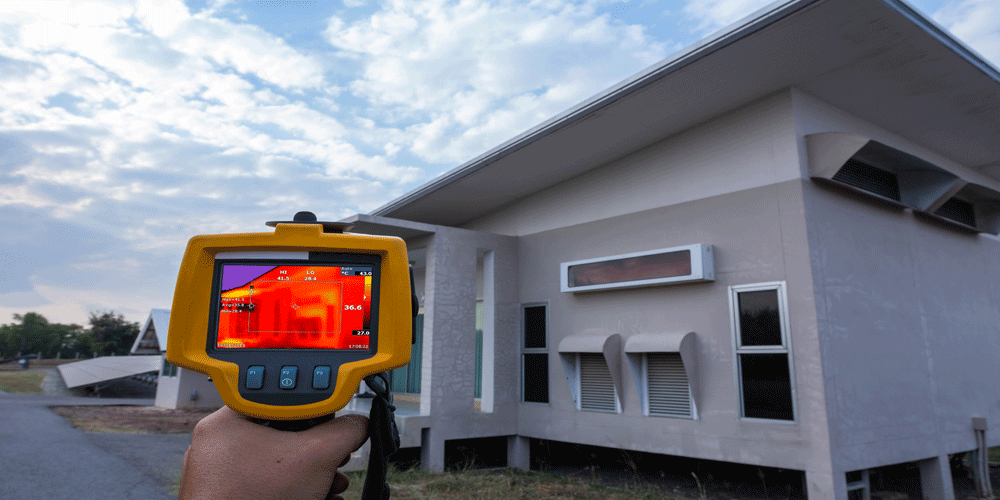Electrical Thermal Imaging Glossary of Terms
The terminology used in the thermal imaging in building electrical systems can be quite extensive. To try and help we have written the following Electrical Thermal Imaging Glossary of Terms – we hope it helps.
Common terms used in electrical thermal imaging
- Absorptivity: The ability of a material to absorb thermal energy.
- Baseline Image: A reference thermal image against which future thermal images are compared.
- Conductivity: A measure of how well a material conducts heat.
- Delta T: The temperature difference between two points.
- Emissivity: The efficiency with which a surface emits thermal energy.
- False Colour: A colour assigned to specific temperature ranges in a thermal image.
- Gain: The amplification of the thermal signal in the imager.
- Hot Spot: An area of higher temperature indicative of a potential problem.
- Infrared: Electromagnetic radiation with wavelengths longer than visible light but shorter than microwaves.
- Joule: A unit of energy in the International System of Units.
- Kelvin: A unit of measure for absolute temperature.
- Load: The amount of electricity flowing through an electrical system such as distribution boards etc.
- M emissivity: A material’s relative ability to emit infrared energy.
- NETD (Noise Equivalent Temperature Difference): The smallest temperature difference detectable by a thermal camera. The lower the NETD the better the thermal imaging camera.
- Opacity: The degree to which a material is impervious to infrared radiation.
- Palette: The set of colours used to represent temperature values in a thermal image.
- Quantum Efficiency: The effectiveness of a sensor in converting photons to electrons.
- Resolution: The smallest detail that can be resolved by the thermal imaging camera. Most good cameras should have a resolution of 640 x 480.
- Spot Measurement: Temperature reading of a specific spot in the thermal image.
- Thermogram: The actual thermal image taken during a infrared inspection.
- U-Value: A measure of thermal transmittance through a material.
- Vignetting: A reduction in image brightness or saturation at the periphery compared to the image centre.
- Wavelength: The distance between successive peaks of a wave, such as in infrared radiation.
- Xenon Flash Lamp: A high-intensity light source used in some thermal imaging applications.
- Yaw: The side-to-side movement or rotation of a thermal imaging camera.
- Zero Point Calibration: The process of setting the thermal imaging camera to a known reference temperature.
The list provided above serves as a foundational overview of common terms utilized in thermal imaging for building electrical systems. It’s not exhaustive, and if any items are missing from our Electrical Thermal Imaging Glossary of Terms, please feel free to reach out to us.
Our services encompass:
- Electrical Thermal Imaging Surveys
- Thermal imaging inspection of electrical systems
- Conducted by our team of Level 3 certified professional Thermographers, who possess extensive experience in engineering, construction, maintenance, management, and survey work.
- Utilizing highly accurate thermal imaging equipment to detect faults accurately, including those potentially overlooked by other devices.
Our thermal imaging service includes:
- Deployment of an ITC trained thermographer and level 3 reporting assessment employing a large format FLIR P6n-Series (640×480 resolution) thermal imaging camera.
- External thermographic inspection of electrical systems covering distribution boards, fuse boards, switchgears, switchboards, control panels, busbar systems, and transformers.
- Identification of loose connections, overloaded or fatigued components, uneven voltage distribution, and blockages in cooling tubes of transformers.
- Provision of a detailed report highlighting areas of concern.
For further details on our thermal imaging service for electrical systems in London, please don’t hesitate to contact us via email at in**@****************co.uk or by calling us on 07775 623464.
How can we assist you? If you require expertise in acoustic consulting or noise engineering, we’re here to help.
CONTACT US Why Choose Us:
- We prioritize achieving pass results
- Competitive pricing
- Friendly and proactive service
- Experienced consultants
- UKAS & ISO Accredited
- Fast Response
- Rapid Turnaround of Results
- Nationwide coverage
- Single pre-completion solution
CONTACT US TODAY!
